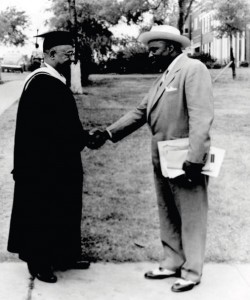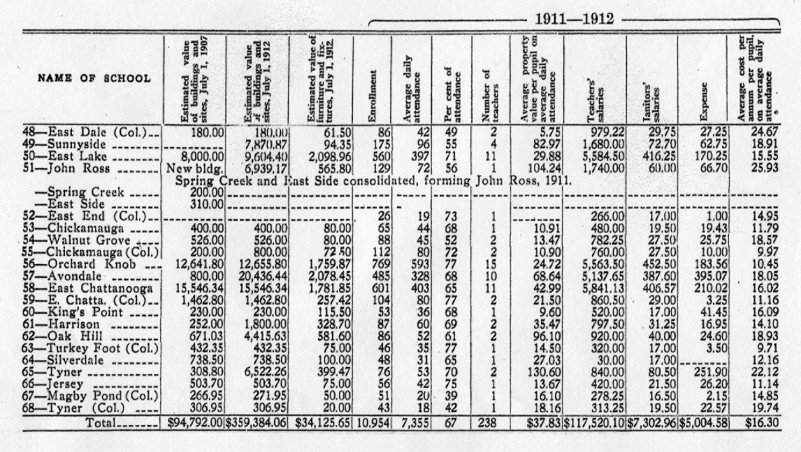Walter Caldwell Robinson, Sr. was the publisher and editor of the Chattanooga Observer.
The contributions made by Walter Caldwell Robinson certainly deserve to be recorded and passed on to future generations. He played a very vital role in the black man’s struggle in his city, state and the nation. Robinson was responsible for lessening the burdens of thousands of black Americans and spent the majority of his life doing what was often thought impossible to get recognition and acceptance for his people as humans and first class citizens.
Walter was born the son of sharecroppers in Larkinsville, Alabama on July 17, 1893. His family lived in Alabama and worked the farm of a white men until Walter was nine years old.
Walter’s parents, Joseph and Elizabeth Robinson decided to move to Chattanooga, Tennessee when he was nine, seeking better employment and educational opportunities for their children. In Chattanooga their economic status improved, but due to segregation and discrimination, their “plight” was yet very bleak.
In spite of these despairing circumstances the children, Floyd, Monroe, Jessie, Rosa, Fannie, Amanda and Walter C. Robinson were able to lift themselves to a higher level of participation in a tightly segregated society.
Robinson showed signs of a businessman and leader at an early age. At age 11, he secured employment in a foundry and by age 16 was operating a laundry business of his own.
Walter Robinson married one of his neighbors and classmate, Cora Adair. To this marriage was born seven children: Evelyn, Marian, Walter Jr. ,Jessell, Alma Lee, Camille and Lucille.
Religion was an important aspect of a black man’s life during this period in Chattanooga, Tennessee. Therefore Walter, Cora and their children were very active members of the Second Missionary Baptist Church. Robinson became President of the Baptist Young People’s Union soon after joining the church in his youth.
At age 21, he became a Trustee of his church. Robinson was an asset to the church because he was able to influence outstanding ministers to accept the pastor-ship of the church when the church was without a minister and after becoming a politician, he was able to raise large sums of money for religious undertakings by asking wealthy whites that he had come in contact with for donations.
Walter began attending the meetings of his Fourth (4th) Ward. Because of the interest he exhibited in ward, local and national politics and his leadership ability, he was elected Chairman of this ward defeating Hiram Tyree who had been Ward Leader for many years. Walter was very successful in creating interest and participation among black citizens.
In a short while Walter’s influence spread throughout Chattanooga and Hamilton County because he established the Colored Voters League of Greater Chattanooga for the purpose of getting recognition for blacks through a united group.
In 1926, Robinson was selected to conduct a campaign tour of Northern and Northwestern states by the National Republican Executive Committee. In his addresses he encouraged blacks to support the Republican candidates for President Vice President and for congress because he felt that this was the best avenue for ending segregation and discrimination.

Because of his political involvements, he was chosen to be an alternate delegate to the Republican National Convention in Kansas City, Missouri for the first time in 1928. Thereafter he was an alternate delegate at each national Republican Convention until his health failed in 1963.
H. D. Huffacker was supported by Walter Robinson and the Colored Voters League of Greater Chattanooga for the position of Commissioner of Education in 1927. Huffacker was elected and once in office gave Robinson a job as a Truant Officer for the Chattanooga Public School System. He was responsible for seeing that black boys and girls would attend school, but because of his power and leadership ability he was given the responsibility of suggesting blacks to be hired as teachers, janitors and in other departments of the city. Robinson worked in this capacity until a candidate that he opposed was elected Commissioner of Education in 1935.
Upon resigning as a truant officer in 1935, Robinson began working fulltime for the success of his newspaper business which he started in 1933. This newspaper (The Chattanooga Observer) was initiated for the purpose of expressing his views to benefit the Republican Party, and to defeat candidates in local elections who Robinson felt were not the best candidates for the good of the black citizens and for the purpose of enlightening and uniting the black citizens of the Chattanooga area.
Robinson was continually elected Chairman of the Fourth Ward until Urban Renewal split the ward in 1959. He was also continually elected Chairman of the Colored Voters League of Greater Chattanooga until his death. His newspaper a 35 year venture was published from 1933 until his death in 1968.
Walter Caldwell Robinson was a black man who possessed an unusual propensity for achievement. He emerged as a leader in his community and through the power that he gained, organized the masses of blacks and realized many achievements. He was successful in securing jobs for his followers, as well as recognition and representation in politics, and spent the majority of his life striving to help blacks attain power and first class citizenship.
The period in which Robinson struggled was indeed challenging. The masses of black people during the 1920’s – 1960’s in Chattanooga, Tennessee were of the lowest socio-economic status and possessed little educational training. Robinson organized Blacks and spoke with power to whites because of his support from the black masses. He printed in his newspaper evils that were placed on Blacks by Whites and openly fought discrimination, segregation and prejudice during a period when intimidation, that would lead to lynching, was about as common as prayer meetings and the Ku Klux Klan was as revered by whites in the South as a religion.
